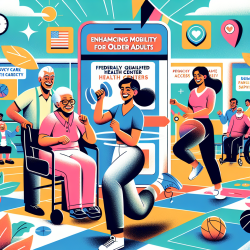Introduction
The ability to move freely and independently is a cornerstone of healthy aging. However, as individuals age, mobility loss becomes a significant concern, often leading to decreased access to primary care and increased health risks. A recent study published in the Journal of Aging Research highlights how Federally Qualified Health Centers (FQHCs) are mitigating these challenges through innovative transportation services.
Understanding the Impact of Mobility Loss
Mobility loss in older adults is linked to a range of adverse outcomes, including increased risk of falls, loss of independence, and higher mortality rates. The inability to access primary care services due to mobility challenges can exacerbate these issues, leading to unnecessary hospitalizations and higher healthcare costs. The research underscores the importance of addressing these barriers to ensure older adults receive the care they need.
Case Studies: FQHCs Leading the Way
The study examines transportation programs at four FQHCs across the United States:
- LifeLong Medical Care (Oakland, CA): Offers transportation through partnerships with public transit and private taxi services, providing door-to-door service for older adults.
- Hudson Headwaters Health Network (Queensbury, NY): Operates a wheelchair-accessible bus program that facilitates access to medical appointments for older adults in rural areas.
- North End Community Health Center (Boston, MA): Provides an on-demand van service for older adults, ensuring easy access to primary care and other essential services.
- Aaron E. Henry Community Health Services Center, Inc. (Clarksdale, MS): Runs the Delta Area Rural Transit System (DARTS), offering comprehensive transportation solutions for rural communities.
Implications for Practitioners
For practitioners, these case studies offer valuable insights into how transportation services can be integrated into care models to improve outcomes for older adults. By understanding the specific needs of their communities and leveraging partnerships, practitioners can develop tailored solutions that enhance access to care.
Encouraging Further Research
While the study provides a compelling overview of successful transportation programs, it also highlights the need for further research. Practitioners are encouraged to explore additional strategies and collaborate with policymakers to expand access to care for older adults. By doing so, they can contribute to a more inclusive and effective healthcare system.
Conclusion
The findings from this research underscore the critical role of transportation services in improving access to primary care for older adults. By implementing similar programs, practitioners can help mitigate the impact of mobility loss and promote healthier aging. To read the original research paper, please follow this link: Federally Qualified Health Centers Minimize the Impact of Loss of Frequency and Independence of Movement in Older Adult Patients through Access to Transportation Services.










